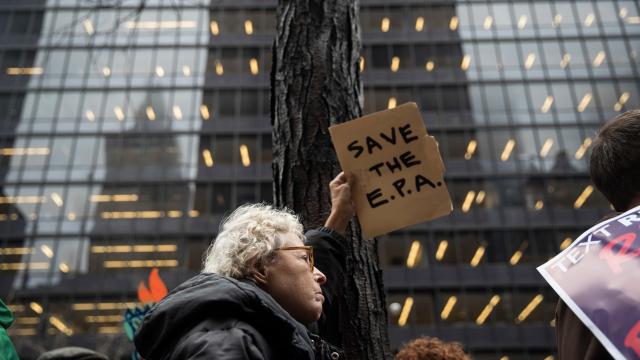Some days, you may roll out of bed and wonder why the hell you’re working a job that doesn’t make a difference where your boss treats you like crap. You could look for a new job. Or you could wash that sense of ennui away by realising it could be worse. You could be a scientist at the US Environmental Protection Agency (EPA).
On Tuesday, the Union of Concerned Scientists (UCS) released the results of a survey it conducted about the work lives of US federal scientists. They show the EPA is home to some of the most hard up scientists in the federal government. Many respondents expressed frustration that politics gets in the way of their jobs. Morale at the agency seems low, with a lot of empty desks as coworkers shuffle off to greener pastures and aren’t replaced.
“There was no secret about [the] Trump administration agenda to try and deregulate all the work going on at the agency,” Jacob Carter, a research scientist with UCS’ Center for Science and Democracy, told us. “That’s work scientists have worked five, 10, 20 years on. They are watching that work get flushed down the toilet.”
The ways in which the EPA has wiped science out of its decision-making are too numerous to list here, but suffice to say everything from air quality to climate change is under fire.
A whopping 70 per cent of respondents at the EPA said they strongly agreed or agreed that “the presence of senior decisionmakers who come from regulated industries or have financial interest in regulatory outcomes inappropriately influences agency decisions”. Eight-two per cent of respondents said political interests are standing in the way of creating science-based policy.
And 61 per cent said that scientific advisory boards — outside experts convened to provide impartial advice — aren’t as good as they were before Scott Pruitt stocked them with industry types or wiped them out completely.
“The current administration sees protecting industry as part of the agency’s mission and does not want to consider information that would encourage taking action that might reduce industry profit even if it’s based on sound science,” one anonymous scientist wrote in the survey. “We are not fulfilling our mission to protect human health and the environment as a result.”
The survey responses were collected in February and March this year, making them the first comprehensive survey of scientists under the Trump administration.
UCS sent the survey to 63,000 scientists across 16 agencies and netted 4211 responses. Those agencies were largely ones responsible for enforcing regulations or making new ones. Though it includes pure science agencies such as the US Geological Survey, others such as NASA or the National Science Foundation weren’t included.
For the EPA, UCS sent out 14,856 and got 449 full responses, a response rate of a little over three per cent. It’s possible scientists were too fearful to respond, didn’t care enough to, or that there’s a large contingency of researchers quietly sitting at their desks, happy the deep state is finally getting its comeuppance.
Turnover at the top of the EPA after the survey could lead to different responses in the next round. Andrew Wheeler, the man who is acting as the replacement for Scott Pruitt, has been somewhat more transparent. He’s sent out an email to staff laying out his goals, something his predecessor never did. That said, he’s also a former coal lobbyist who has pursued the same anti-science agenda as Pruitt.
It isn’t not all bad news around the US federal government. Morale has increased at the Food and Drug Administration and other agencies such as the National Oceanic and Atmospheric Administration (which currently lacks a permanent leader) are humming along with minimal interference. Nearly two-thirds of respondents said that scientific integrity policies, federal guidelines put in place to make sure science isn’t hurt by politics and scientists aren’t silenced, have been observed.
Many scientists also know their whistleblower rights.
